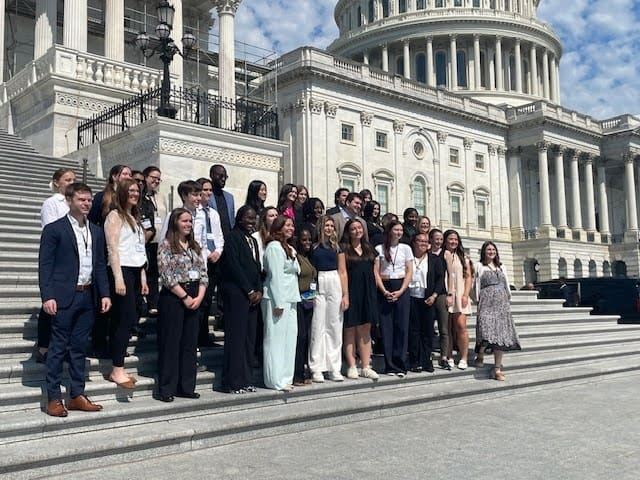Student Advocates Lobby on the Capitol for LD Day of Action
In June, more than thirty advocates from Eye to Eye and the National Center for Learning Disabilities partnered to lobby for LD Day of Action in Washington, D.C. Students came from all corners of the country to speak with their elected representatives about education policy and lobby for the day. LD Day of Action is an annual event where neurodiverse students and their allies meet with their elected representatives to discuss education policy, engage in political advocacy, and demonstrate leadership alongside their peers.
This day reflects months of preparation, training, and community building with advocates with various experiences. Some seasoned advocates have lobbied before, and some were first-time lobbyists with Eye to Eye and the National Center for Learning Disabilities. Young advocates with learning disabilities met with 50 congressional offices in D.C. about education policy and how they can improve the educational experiences of young people.

This year, students lobbied on behalf of 5 key bills:
- RISE Act: Help improve access to accommodations in college and graduate schools by passing the RISE Act and reducing financial barriers to receiving accommodations in college and graduate school by allowing students to use documentation such as IEP or 504 plans from high school rather than having to get retested. The RISE Act would invest $10 million in getting technical assistance for disability in higher education. It aims to make accommodations more fair and clear for college students.
- Educators for America Act: Help improve teacher preparedness and representation. The Educators for America Act helps work towards greater teacher classroom preparedness and understanding while helping address teacher shortages and teacher representation. It takes steps towards reducing financial barriers to becoming a teacher while funding programs that support improving teacher diversity caliber and better equipping teachers for the distinct needs of the college or school district.
- IDEA Full Funding Act: Help improve school resources to support disabled students and improve understanding. It incrementally increases congressional funding from 10.3% of IDEA to the expected 40% over ten years. This helps fund the services and resources that help disabled students in school.
- Advanced Coursework Equity Act: Directs the Department of Education to establish three grant programs to increase enrollment and performance of underrepresented students in advanced courses and programs.
- Keeping All Students Safe Act (KASSA): Prohibits the use of seclusion and limits the use of physical restraint in schools and Head Start programs that receive federal funding.
To learn more about how you can join this movement, sign up for our newsletter.
